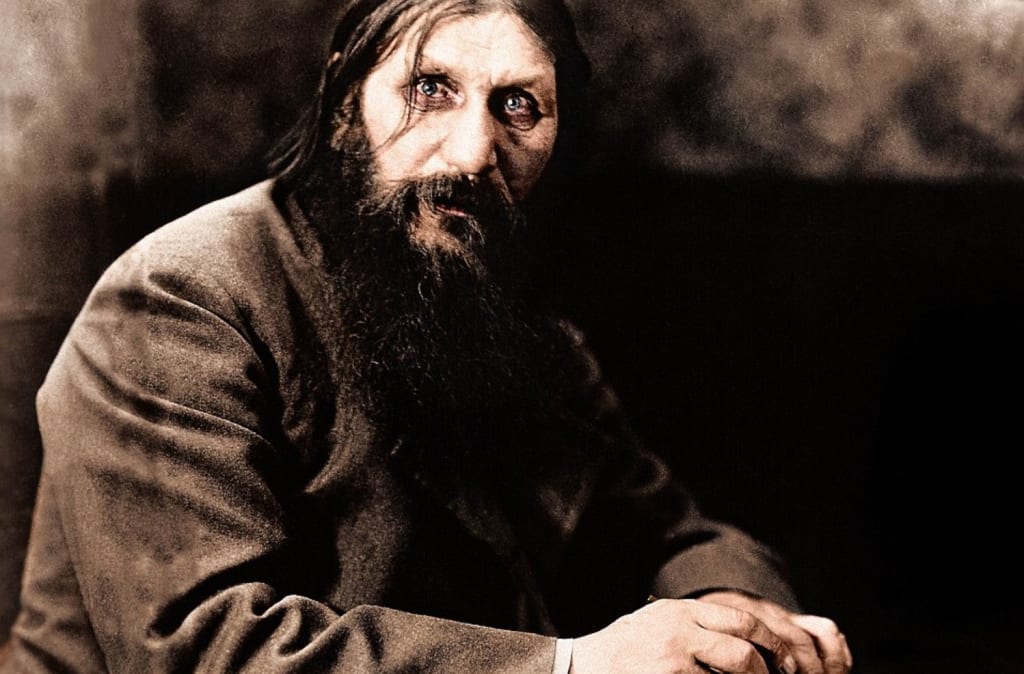Russia’s Greatest Love Machine
The story of one of imperial Russia’s most prominent figures.

Grigori Yefimovich Rasputin was born in 1869, in Siberia, to peasant parents. He grew up to become a Russian mystic and a holy man even though he had no affiliations with the Russian Orthodox Church.
He later befriended Emperor Nicholas II and his family, especially his wife Empress Alexandra, and became a prominent and influential figure at court. His life abruptly ended when he was murdered in a conspiracy concocted by a group of nobles and right-wing politicians. His life was a series of unfortunate events ruled by a respectable talent of con-artistry.
There lived a certain man in Russia long ago
Rasputin was born a peasant in imperial Russia around the year 1869 in the small village of Pokrovskoye.
His father, Yefim, was a farmer and a church elder who had married his mother, Anna Parshukova, in 1863. Yefim was also a government courier and was tasked with ferrying goods and people between towns.
Apart from Rasputin, the couple had seven other children who died either in infancy or early childhood. A ninth child, young Feodosiya, was Rasputin’s only sister and was extremely close to him. Later in their lives, he would become the godfather to her children.
Almost all accounts about Rasputin’s early life and childhood are fabricated stories and rumors made by his enemies after his death. According to historian Douglas Smith: “it is a black hole about which we know almost nothing.” What we know for sure is that, just like all other peasant families in Siberia, Rasputin was uneducated and remained illiterate well into his early adulthood.
He could preach the Bible like a preacher
At the age of eighteen, Rasputin met a young peasant girl named Praskovya Dubrovina, they married several months later in 1887. Although his wife was absent in his rise to prominence and later days, she remained devoted to him until his death.
Ten years later, the Russian peasant developed a newfound interest in religion. He left his home village of Pokrovskoye to go on a pilgrimage to the St. Nicholas Monastery.
The reasons behind this pilgrimage are unknown. While some people claim it was because Rasputin was involved in a horse theft in his village, Douglas Smith confirms that his decision could only have been occasioned by some sort of emotional or spiritual crisis.
His pilgrimage to St. Nicholas was transformative. There, he met a church elder named Makary and was profoundly humbled by his teachings. It was probably during his time in the monastery that he learned to read and write. He returned to Pokrovskoye a completely different man, looking completely disheveled, swearing off alcohol, and praying and singing more fervently than ever.
During the years that followed, Rasputin lived a strannik (holy wandered), leaving his village to wander the country years at a time and visit a variety of religious sites. By the early 1900s, he had developed a small circle of followers from his family and other local peasants. In his father’s root cellar, the group would meet for secret prayer meetings, arousing the suspicion of the priest and other villages.
It was believed that female followers were asked to ceremonially wash Rasputin during those secret meetings and that they even involved orgies, flagellation, and weird religious chants. To this date, there is nothing proving or disproving these claims.
He was the man to please in all affairs of State
In the early 1900s, Rasputin’s charismatic vibe began to spread in Siberia. At some point between 1903 and 1905, he traveled to the city of Kazan where he became known as a wise and perceptive holy man who could help people relieve their spiritual crises.
He made a favorable impression on many high-ranking church officials of Kazan who ended up recommending him to Bishop Sergei for a position in the St. Petersburg Theological Seminary, of which Sergei was the rector.
Upon arriving in St. Petersburg and meeting Bishop Sergei, Rasputin was introduced to the church leaders of St. Petersburg, very rich and influential men. That is how he made his way into the very chic and select circles where the aristocracy gathered to discuss religious matters. Some of those men he met during his social rise to power are among some of his earliest followers.
It wasn’t until the 1st of November 1905 that Rasputin would meet Czar Nicholas II in the Peterhof Palace. This event is recorded in the Czar’s personal diary. “Alexandria and I made the acquaintance of a man of God — Grigory, from Tobolsk province”, he wrote.
At some point, the empress and many members of the imperial family were convinced that Rasputin possessed powers that could heal Alexei, the heir apparent. This would forever change his life!
She believed he was a holy healer who would heal her son
Rasputin’s influence with the royal family stemmed from the belief of Alexandra and her court that he could ease the pain of her son and stop his bleeding (he suffered from hemophilia). The Czarina had a passionate attachment to Rasputin due to this belief, and thus he became an indispensable member of the royal entourage.
During the summer of 1912, Czarevich Alexei developed an extremely bad hemorrhage which caused a large hematoma. He appeared to be close to death to the point where, in desperation, Alexandra sent a telegram to Rasputin (who was in Siberia) to pray for Alexei.
Shortly after, Rasputin wrote back: “God has seen your tears and heard your prayers. Do not grieve. The Little One will not die. Do not allow the doctors to bother him too much.”
Two days later, Alexei’s bleeding stopped. Dr. Fedorov, one of the doctors who examined the prince, said that the recovery was wholly inexplicable from a medical point of view. He later admitted that Alexandra shouldn’t be blamed for believing Rasputin to be a miracle man.
“Rasputin would come in, walk up to the patient, look at him, and spit. The bleeding would stop in no time. How could the empress not trust Rasputin after that?”, he said.
He ruled the Russian land (never mind the Czar)
Rasputin’s new unofficial position as Alexei’s healer brought him considerable status and power at court.
He was soon appointed as the Czar’s lamplighter, in charge of keeping the lamps that burned in front of religious icons in the palace lit, and thus having regular access to the court and the royal family. He used this newfound power to full effect, accepting bribes in the forms of money and sexual favors, and expanding his influence.
This power made him a controversial figure in imperial Russia. His enemies accused him of religious heresy and rape, having an unholy influence on the Czar, and even having an affair with the Czarina.
First, the opposition grew within the church. The clergy at his hometown quickly denounced him as a heretic, a charlatan, and as having used his influence to spread false doctrines.
Then, even more prominent figures opposed Rasputin publicly. Prime minister Peter Stolypin and the Okhrana, the Czar’s secret police, ordered an investigation into his activities. They were unsuccessful in barring him from St. Petersburg, and he remained a prominent influential figure inside the royal family.
In 1909, one of his female aristocratic followers accused him of rape and, as early as 1910, rumors of Rasputin assaulting his female followers and other female figures in his life (including the Czar’s youngest daughters Olga and Tatyana) were all over the press.
World War I, the crumbling state of feudalism, and government bureaucracy all contributed to Russia’s declining economy at the quickest rate. Many blamed Alexandra and Rasputin (because he had an influence on her and the Czar was often away at war). One member from the Duma (part of the legislative body of imperial Russia), Vladimir Purishkevich, stated:
“The Czar’s ministers had been turned into marionettes, marionettes whose threads have been taken firmly in hand by Rasputin and the Empress Alexandra Fyodorovna — the evil genius of Russia and the Czarina… who has remained a German on the Russian throne and alien to the country and its people.”
They put some poison into his wine
A group of nobles led by Prince Yusupov and right-wing politician Vladimir Purishkevich decided that Rasputin had become a threat to the empire through his influence over Alexandra. So, they concocted a plan to kill him in December 1916 by luring him to the Yusupovs’ palace. Prince Felix Yusupov recounts the episode in his memoirs.
He claimed that he invited Rasputin into his palace after midnight and the two sat in the basement. He then offered Rasputin tea and cakes laced with cyanide. To Yusupov’s surprise, he did not appear to be affected by the poison. Rasputin then asked for some wine, which had been also poisoned, and drank three glasses. He was still not showing any signs of distress.
Yusupov, confused, excused himself from the room and went out to bring a revolver. Upon returning, he told Rasputin he’d “better look at the crucifix and say a prayer”, after which he shot him in the chest.
Yusupov says he then drove with his conspirators to Rasputin’s house. One of them disguised himself as the dead man and went into the house, to make it look like he returned home.
After they went back to the Yusupovs’ palace, prince Felix went to the basement to check the body. Rasputin then leaped and attacked Yusupov, who managed to flee with some effort. Rasputin soon followed and made it to the courtyard before being shot by Purishkevich.
After wrapping him in a cloth, the conspirators drove to the Petrovsky Bridge and dropped him in the Malaya Nevka river.
About the Creator
ElMehdi ElAzhary
Storyteller. Mental health activist. History buff. & Marketing enthusiast. This is your daily dose of unconventional writing.






Comments
There are no comments for this story
Be the first to respond and start the conversation.